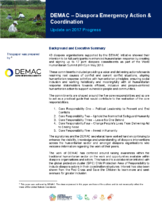This site is inactive as of February 2020. For updated information on an initiative's work, please refer to their own website as listed in their contact details.
Summary
When crises erupt, diaspora initiatives and organisations are often first-line responders, quickly sending relief aid, money and volunteers directly to affected communities and support local structures. Due to their ties and networks in their countries of origin, diasporas have access to knowledge of when a crisis is about to occur, are able to assist quickly during crisis, also in areas with limited access to conventional actors, and continue providing support as the crisis stage moves to rehabilitation and recovery.
Diaspora organisations and representatives stand together in a spirit of the commitments required for a more efficient and complementary humanitarian response.
Partners
Following the World Humanitarian Summit, 41 Diaspora organisations have signed up to 17 commitments that respond to the five core responsibilities of the Agenda for Humanity. They will strive to realize these principle commitments within the varying frameworks of their humanitarian interventions.

Goals
The following is a summary of the commitments:
- Advocacy: Providing a voice and actions that encourage transformative action towards resolving root causes of conflict and/ or current conflict situations.
- Inclusion: Aligning their humanitarian response work and activities with humanitarian principles.
- Engagement: Ensuring participation and consideration in activities for those with disabilities and other vulnerable groups, through communication methods and in delivery of response.
- Impact Enhancement: Working holistically and meaningfully with all humanitarian response stakeholders to ensure no one is left behind.
- Partnerships: Strengthening and formalizing interactions and relationships with all stakeholders to enhance outcomes and contribute to knowledge development, timely and responsive action and a cohesive, complementary humanitarian sector.
Resources


 summary
summary partners
partners goals
goals Stakeholder reports
Stakeholder reports resources
resources contacts
contacts